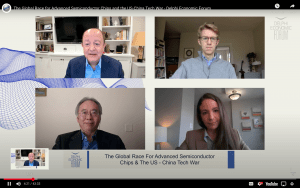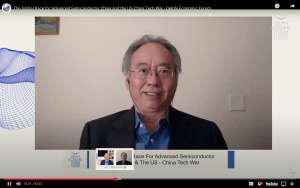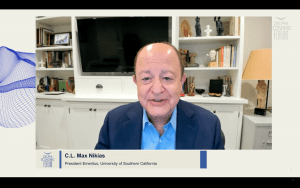
USC President Emeritus and Professor of Electrical Engineering C. L. Max Nikias organized and led a panel, “The Global Race for Advanced Semiconductor Chips and the US-China Tech War” at the recent international Delphi Economic Forum.
“Who would have thought ten years ago that semiconductor chips would become the world’s most important industry,” Nikias said setting the stage for a lively discussion. “The United States, the European Union, particularly the Netherlands, Japan, South Korea and Taiwan are all part of the complex supply chain required to create these chips. Notably absent from this group is China. Despite a mighty effort, China has been unable produce the most advanced chips and currently spends $300 billion a year importing semiconductor chips.”
Lindsay Gorman, Fellow for Emerging Technologies at the German Marshall Fund’s Alliance for Securing Democracy said, “Semiconductor chips are at the center of artificial intelligence (AI) and 5G networks. They are the future of the internet and the next generation of all technologies that have to do with the harnessing and storage of information.”

Semiconductor chips also have well-known military applications. The Trump Administration imposed controls to keep advanced chips and other technologies from migrating to China’s military, and over concerns about the theft of intellectual property. The Biden Administration has continued the controls and both administrations worked to enlist the support of Western democracies to follow suit.
Complicating matters further is a growing worldwide shortage of semiconductor chips. “AI is a big part of this but not the only part,” said Remco Zwetsloof, research fellow at Georgetown University’s Center for Security and Emerging Technologies. The advanced chips used for big AI apps are capable of making thousands of calculations very fast while using a minimum of power.
“Self-driving cars have lots of sensors and take in images and other kinds of data. Their chips process it, store it, transmit it and then make a decision. Do we brake? Do we turn left? Do we turn right? It makes for lots of computational demands,” Zwetsloof said. But he added that less advanced chips are found in a host of more mundane items like washing machines, toasters and traditional cars. “Even your toothbrush may have a chip.”
Auto manufacturers have stopped making some models of cars because they can’t get the chips they need. Chi-Foon Chan, president and co-chief executive officer of Synopsys, a Silicon Valley company that produces the software used to design semiconductor chips, noted that automotive chips have very specific algorithms. And because of safety concerns, the chips must last longer than chips in electronic devices, maybe 15 or 20 years.

“We don’t carry around 15- or 20-year old cell phones,” Chan said.
“Ten years ago, cars needed 10 or 20 chips. Today, a car may contain 300 chips,” Nikias added.
“We are in a very strange time right now. Covid has had an effect,” Chan said. When the pandemic started and everyone used Zoom to work from home, demand surged for the chips used in networking and in electronic devices. At the same time demand for automotive chips plummeted. But as the pandemic ebbed, the need for automotive chips has grown rapidly.
“You can’t change back right away,” Chan said before describing the extraordinarily complex supply chain underlying semiconductor chip production. “There’s the design part, the equipment part, the manufacturing part, and then there’s applications. The talent pool is all spread out.”
Zwetsloof said the semiconductor industry is so global and so complex that no single country could hope to dominate all of the parts of the supply chain at the cutting edge without spending huge amounts of money. So countries and companies concentrate on specific areas of chip production. For example, photolithography machines usually come from the Netherlands and Synopsys software is usually used design chips.
“China wants to take a leadership role in the world in industries dependent on semiconductors,” Gorman said. China’s model is to offer people a better life by processing massive quantities of data. “And oh, by the way, they’ll control the information, stifle what you can say, and censor and surveil.”
The tension over semiconductor chips is part of “a broader competition between autocracies and democracies,” she said.

In addition to a shortage of chips, the highly talented scientists and engineers needed to produce them are in short supply. Countries and companies compete to recruit human talent, including students. After reports that China had recruited as much as 10 percent of Taiwan’s semiconductor workforce, Taiwan banned all job listings for technology jobs.
“China is spending a lot trying to recruit foreign talent, especially in Taiwan,” Zwetsloof said. “China’s also recruiting in the U.S. but they’ve been less successful.”
Nikias said the open tech ecosystem in the United States and other Western democracies has fostered rapid technological advances. But the technology competition, concerns about espionage and intellectual property theft, have increased calls for restrictions such as excluding Chinese students and researchers in core high-tech fields.
“We gain so much more from inviting global talent and getting the best and brightest to stay here, to learn here, to set up their companies, to become U.S. enterprises, to become taxpayers,” said Gorman. “It’s not just the openness of our innovation system, but the openness of our democracy. The idea that anyone can come here and work hard and succeed. That’s not only a core of our economic success, but an attractive part of our power internationally.”

Still, Gorman expressed some reservations about the threat of espionage and intellectual property. “I don’t want to downplay it. There are estimates of up to $100 billion a year lost to intellectual property theft. We have to measure the risk and the benefits.”
“As a former engineering dean, I can tell you that one reason the U.S. has so many international students in science and engineering, especially Ph.D. students, is that we don’t have enough domestic students who want to study in those areas,” Nikias said in closing. “We need education reform but that’s a topic for another panel.”
The Delphi Economic Forum, was held May 10th to 15th in a hybrid format in both Athens and worldwide on the internet. The semiconductor panel was organized by Nikias in his role as president of the International Advisory Board to the Council for International Relations, Greece.
The complete panel discussion can be found here.
C. L. Max Nikias, USC President Emeritus and Life Trustee, holds the Malcolm R Currie Chair for Technology and the Humanities and is Director of the USC Institute for Technology Enabled Higher Education.